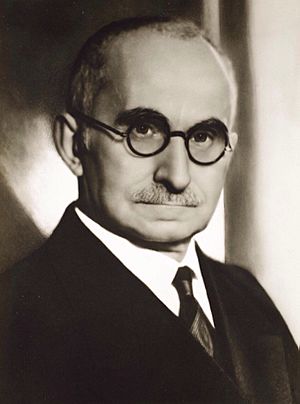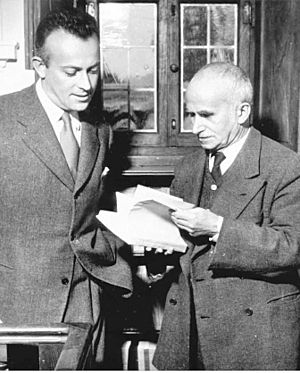Luigi Einaudi facts for kids
Quick facts for kids
Luigi Einaudi
|
|||||||||||||||||||||
|---|---|---|---|---|---|---|---|---|---|---|---|---|---|---|---|---|---|---|---|---|---|

Official portrait, 1948
|
|||||||||||||||||||||
| President of Italy | |||||||||||||||||||||
| In office 12 May 1948 – 11 May 1955 |
|||||||||||||||||||||
| Prime Minister | Alcide De Gasperi Giuseppe Pella Amintore Fanfani Mario Scelba |
||||||||||||||||||||
| Preceded by | Enrico De Nicola | ||||||||||||||||||||
| Succeeded by | Giovanni Gronchi | ||||||||||||||||||||
| Deputy Prime Minister of Italy | |||||||||||||||||||||
| In office 1 June 1947 – 11 May 1948 |
|||||||||||||||||||||
| Prime Minister | Alcide De Gasperi | ||||||||||||||||||||
| Preceded by | Position established | ||||||||||||||||||||
| Succeeded by | Giovanni Porzio | ||||||||||||||||||||
| Minister of the Budget | |||||||||||||||||||||
| In office 6 June 1947 – 11 May 1948 |
|||||||||||||||||||||
| Prime Minister | Alcide De Gasperi | ||||||||||||||||||||
| Preceded by | Position established | ||||||||||||||||||||
| Succeeded by | Giuseppe Pella | ||||||||||||||||||||
| Governor of the Bank of Italy | |||||||||||||||||||||
| In office 5 January 1945 – 11 May 1948 |
|||||||||||||||||||||
| Preceded by | Vincenzo Azzolini | ||||||||||||||||||||
| Succeeded by | Donato Menichella | ||||||||||||||||||||
|
|||||||||||||||||||||
| Personal details | |||||||||||||||||||||
| Born | 24 March 1874 Carrù, Piedmont, Kingdom of Italy |
||||||||||||||||||||
| Died | 30 October 1961 (aged 87) Rome, Italy |
||||||||||||||||||||
| Political party | Italian Liberal Party | ||||||||||||||||||||
| Spouse | Ida Pellegrini | ||||||||||||||||||||
| Children |
|
||||||||||||||||||||
| Alma mater | University of Turin | ||||||||||||||||||||
| Profession |
|
||||||||||||||||||||
| Signature | |||||||||||||||||||||
Luigi Numa Lorenzo Einaudi (born March 24, 1874 – died October 30, 1961) was an important Italian politician and economist. He served as the second President of Italy from 1948 to 1955.
Contents
Early Life and Education
Luigi Einaudi was born in Carrù, a town in Piedmont, Italy. He grew up in a family with his parents, Lorenzo and Placida Fracchia.
He went to high school at Liceo classico Cavour in Turin. Later, he studied at the University of Turin. During these years, he became interested in socialist ideas. He even wrote for a magazine called Critica sociale.
In 1895, he finished his university studies and earned a degree in law. After that, he became a professor. He taught at the University of Turin, the Polytechnic University of Turin, and the Bocconi University in Milan.
As an economist, Einaudi followed the ideas of the classical school of economics. This was a way of thinking about how money and goods work in a country.
Early Career in Politics
As the 20th century began, Einaudi's political views changed. He became more conservative, meaning he preferred traditional ways of doing things.
In 1919, he became a Senator for the Kingdom of Italy. A Senator is like a lawmaker who helps make decisions for the country.
Einaudi was also a journalist. He wrote for major Italian newspapers like La Stampa and Il Corriere della Sera. He also reported on financial news for the famous British magazine The Economist.
During the time of Fascist rule in Italy, Einaudi was against it. Because of his views, he stopped writing for Italian newspapers in 1926. He started writing for Corriere della Sera again after the Fascist government fell in 1943.
After Italy signed an armistice (a peace agreement) in 1943 during World War II, Einaudi went to Switzerland for safety. He returned to Italy in 1944.
From 1945 to 1948, Einaudi was the Governor of the Bank of Italy. This is a very important role, as he was in charge of the country's money system. He also helped create the Consulta Nazionale. This group helped set up the new Parliament for the Italian Republic after the war.
Later, from 1947 to 1948, he served as the Minister of Finances, Treasury, and Balance. He was also the Vice-Premier, which is like a deputy prime minister.
President of Italy (1948–1955)
On May 11, 1948, Luigi Einaudi was chosen to be the second President of the Italian Republic. He served for seven years.
After his term as president ended in 1955, he became a Life Senator. This meant he could stay in the Senate for the rest of his life.
Einaudi was a big supporter of the idea of a united Europe, known as European Federalism. He believed that European countries should work closely together.
He also loved farming. He personally managed his farm near Dogliani, where he grew grapes to make Nebbiolo wine. He was proud of using the newest farming methods.
Family and Legacy
Luigi Einaudi married Countess Ida Pellegrini in 1903. She came from an important family in Verona.
They had two sons:
- Giulio became a well-known Italian publisher.
- Mario was a professor at Cornell University in the United States. He was also strongly against Fascism. The Mario Einaudi Center for International Studies at Cornell is named after him. Mario also started the Fondazione Luigi Einaudi in Turin to honor his father.
Luigi Einaudi passed away in Rome on October 30, 1961, when he was 87 years old.
The Einaudi Institute for Economics and Finance (EIEF), a research center of the Bank of Italy, is named after Luigi Einaudi to remember his contributions to economics.
Images for kids
See also
 In Spanish: Luigi Einaudi para niños
In Spanish: Luigi Einaudi para niños
 | Emma Amos |
 | Edward Mitchell Bannister |
 | Larry D. Alexander |
 | Ernie Barnes |


